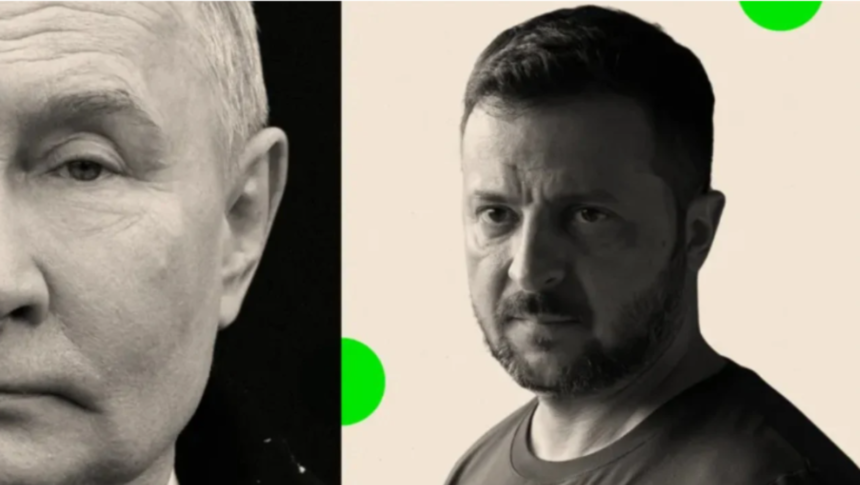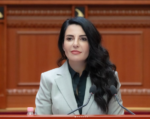The BBC has dedicated a report to the third anniversary of the war’s outbreak in Ukraine.
Kyiv no longer looks like a city at war, as it did three years ago. Shops are open, and travelers are delayed due to traffic blockages on their way to work.
However, since February 12 of this year, when U.S. President Donald Trump called Vladimir Putin, the old nightmares of national disappearance from 2022 have resurfaced. Ukrainians used to be upset about how President Joe Biden restricted weapon systems and limited Ukraine’s use of them. Yet, they knew whose side he was on.
Instead, Donald Trump has been making exaggerated claims, half-truths, and outright lies about the war, echoing President Putin’s views. These include calling Ukrainian President Volodymyr Zelensky a dictator who doesn’t deserve a seat at the table when the U.S. and Russia decide his country’s future. The biggest lie Trump has stated is that Ukraine started the war.
Trump’s negotiating strategy is to offer concessions even before serious talks begin. Instead of pressuring the country that violated international law by invading its neighbor, causing massive destruction and hundreds of thousands of deaths and injuries, he has turned against Ukraine.
His public statements have offered Russia significant concessions, declaring that Ukraine will not join NATO and accepting that Russia will retain at least part of the territory it seized by force. Vladimir Putin’s data shows that he respects strength.
He has not backed down from demanding more Ukrainian territory than his forces currently hold. Immediately after the first talks, held in Saudi Arabia, between Russia and the U.S. since the 2022 invasion, Putin’s foreign minister, Sergei Lavrov, reiterated his demand that no NATO troops be allowed in Ukraine to offer security guarantees.
A veteran European diplomat who has dealt with both Russians and Americans told me that when the seasoned Lavrov met with Trump’s initial Secretary of State, Marco Rubio, “he would have eaten him like a boiled egg.”
Challenging Times
A few days ago, while Trump threw more insults at the Ukrainian president, I went to Kyiv’s highly guarded government district to meet Ihor Brusylo, a senior advisor to Volodymyr Zelensky and deputy head of his office. Brusylo acknowledged the pressure Trump was placing on them.
“It’s very, very hard. These are very, very difficult, challenging times,” said Brusylo. “I wouldn’t say it’s easier now than in 2022. It’s like living it all over again.”
Brusylo said that Ukrainians and their president were just as determined to fight for independence as they had been in 2022.
“We are a sovereign country. We are part of Europe and we will remain that way.”
In the weeks after Vladimir Putin ordered the full-scale invasion of Ukraine, the sounds of battle at the outskirts of Kyiv echoed through streets that were almost deserted. Checkpoints and barricades, sandbag walls and tank traps welded from steel beams were hastily thrown up along Kyiv’s broad boulevards. At the railway station, fifty thousand civilians a day, mostly women and children, boarded trains heading west, away from the Russians.
Platforms were packed, and every time a train pulled out, another wave of panic would follow as people pushed and shoved to board. In those bitter days, amid harsh winds and snowstorms, it felt like the colors of the 21st century were fading into an old black-and-white newsreel that Europeans had until then believed had been securely locked away in the vaults of history.
President Zelensky, according to Joe Biden, “did not want to listen” to American warnings that an invasion was imminent.
Putin’s strike with a Russian scythe was one thing. A full-scale invasion, with tens of thousands of troops and armored columns, surely belonged to the past.
Putin believed that Russia’s powerful and modernized army would make quick work of its stubborn, independent neighbor and its rebellious president. Ukraine’s Western allies also thought Russia would win quickly. On TV news channels, retired generals talked about smuggling small arms to arm a rebellion, while the West imposed sanctions and hoped for the best.
As Russian troops gathered at Ukraine’s borders, Germany delivered 5,000 ballistic combat helmets instead of assault weapons. Vitali Klitschko, Kyiv’s mayor and former world heavyweight boxing champion, complained to a German newspaper that it was “a joke… What kind of support will Germany send next, pillows?”
Zelensky dismissed any idea of leaving his capital to form a government in exile. He abandoned his dark presidential suit for military attire and, in videos and on social media, told Ukrainians that he would fight alongside them.
Ukraine defeated the Russian aggression at its capital. After Ukrainians demonstrated they could fight well, the stance of Americans and Europeans changed. Arms supplies increased.
“Putin’s mistake was that he prepared for a parade, not a war,” recalled a senior Ukrainian official, speaking on condition of anonymity. “He didn’t think Ukraine would fight. He thought they would be welcomed with speeches and flowers.”
Three years later, the war has changed. Although Kyiv has been revived, it still has alarms at night as its air defense detects Russian missiles and drones coming in. The war is closer and more deadly, along a front line over 1,000 kilometers long, stretching from the northern border with Russia and then east and south to the Black Sea.
It is filled with destroyed villages and cities, almost desolate. In the east, in what was once the industrial heartland of Kyiv, Donetsk and Luhansk, Russian forces are advancing slowly, at great cost in lives and equipment.
Many of the volunteers who took up arms three years ago are either dead, maimed, or too exhausted to fight anymore. One of Ukraine’s bitterest mistakes passes among those who are fighting and those bribing their way out of military service. Evhen said they were better off without them.
The Trump Effect
If you’re a real estate agent like Donald Trump was before moving into TV and later presidential politics, you know that destruction makes money. You take a property, demolish it, rebuild it, and profit. The problem with that strategy in foreign policy is that sovereignty and independence don’t have a price. Trump boasts about putting America first, but he’s not prepared to accept that non-Americans might feel the same way about their countries.
Since Trump was sworn in for a second term as president of the United States, he’s been moving the ball of destruction. He sent Elon Musk to the federal government to recover billions of dollars he claims are being stolen or misused. Abroad, Trump, the man of ruin, has laid down assumptions that support the 80-year-old alliance between American and European democracies.
Donald Trump is unpredictable, but much of what he is doing he’s been talking about for years. He’s not the first American president to be upset about how his European allies have saved money by sheltering behind the U.S. defense budget. A phrase used by his defense secretary Pete Hegseth to NATO partners, “President Trump will not allow anyone to turn Uncle Sam into Uncle Nephew,” was a deliberate reference to President Dwight D. Eisenhower.
A U.S. government document from November 4, 1959, records his frustration. It says: “The President said that for five years he has been asking the State Department to lay the facts of life before the Europeans. He thinks the Europeans are close to ‘making a nephew out of Uncle Sam.’”







